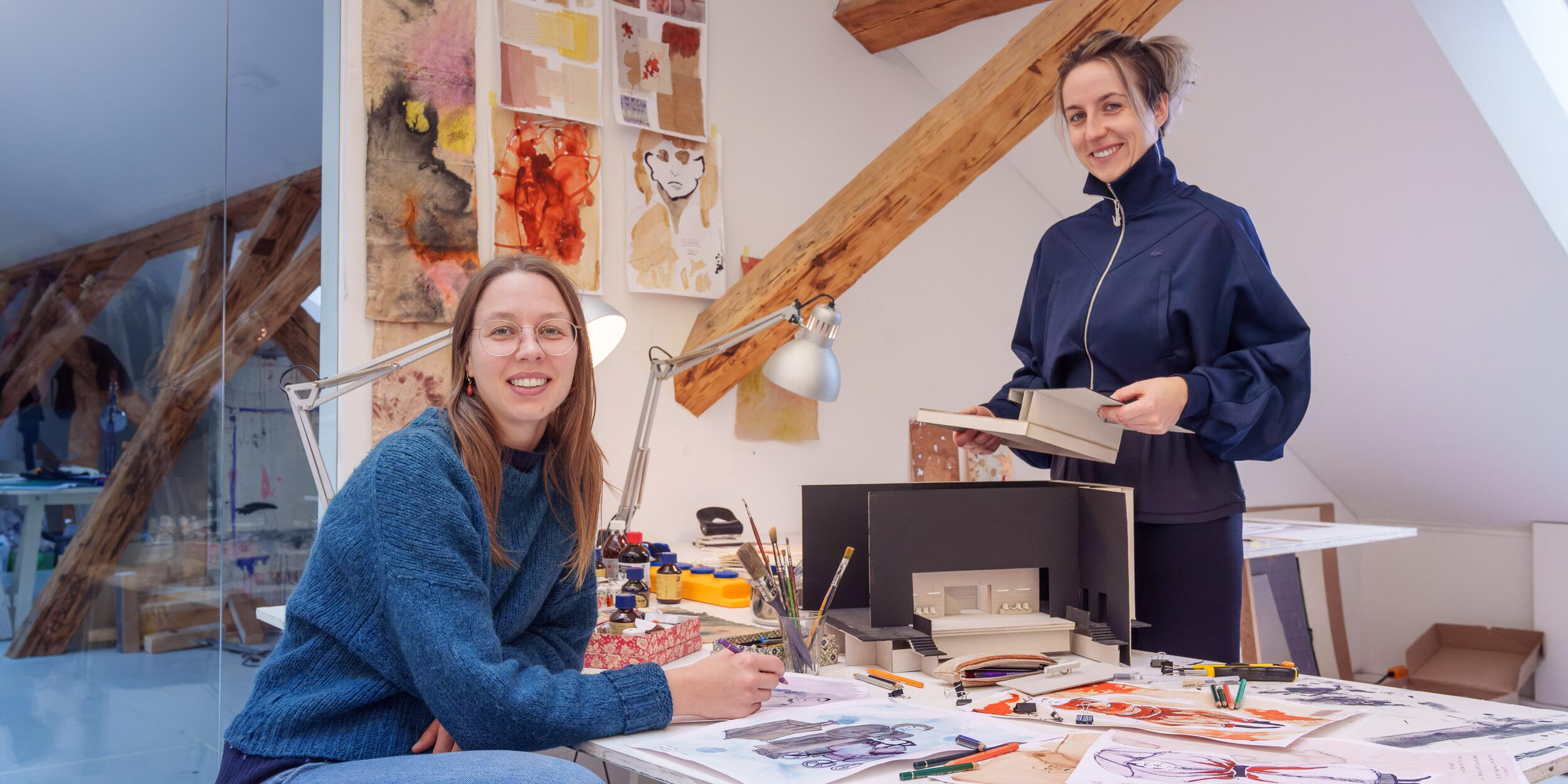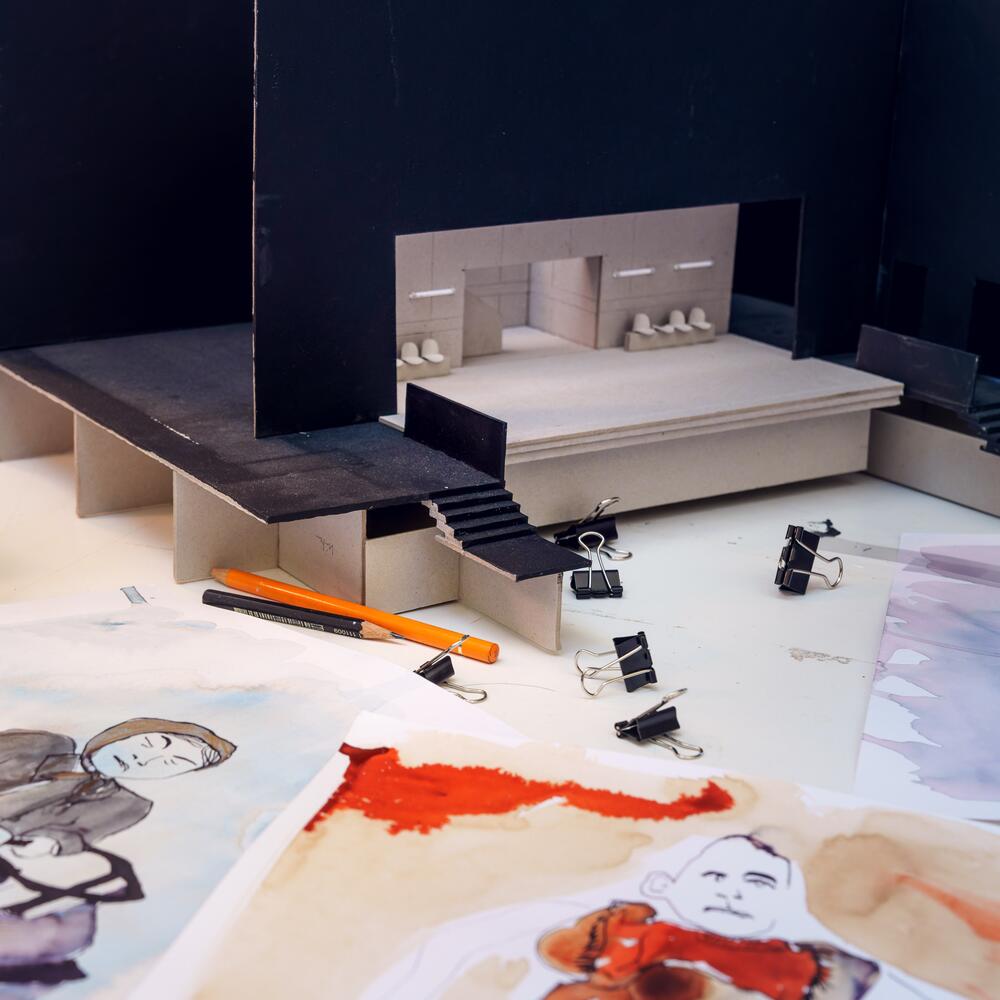Magic, poetics and absurdity

At the beginning of 2025, Florentine Klepper and Kai Röhrig's opera class at the Mozarteum University will bring Christian Jost's ‘Dichterliebe’ to the stage. The two set designers Carla Schwering and Yvonne Schäfer talk about the ideas and realisation of their visions for the stage design.
How did your collaboration with Kai Röhrig and Florentine Klepper for the production ‘Dichterliebe’ come about?
Carla: I'm studying stage and costume design and am in direct contact with the various departments at the Mozarteum University. I already knew Kai Röhrig from the baroque opera ‘Dido & Aeneas’ last summer, for which I did the set design. The theme of ‘Dichterliebe’ and the music by Robert Schumann in combination with the new composition by Christian Jost really appealed to me and I was curious to get to know Florentine. So I applied for this project and got straight into a very exciting exchange.

Since when and how have you been working on your stage and costume designs, first mentally and then concretely? Can we get a little insight into how you work?
Carla: I first got in touch with Yvonne and Florentine for ‘Dichterliebe’ in spring 2024. We started to listen to the music and generally exchange ideas on the overarching themes of poetics, romanticism and the experience of nature, and asked ourselves how concretely we wanted to tell such an ‘abstract’ piece without a narrative. Initial sketches and poetic, imaginative, emotional drafts were created for the music. Even at this early stage, I worked out different types and divided the one ‘I’ into several different characters. After a few revisions, the characters became more contemporary and realistic. My costumes are then created during the rehearsal process: I react directly to the way the singers play, see what helps them in their performance and what accessories they need. I model close to the people and watch a lot of the rehearsals. I pick out pieces from the collection, buy a lot from second-hand shops and alter the pieces, colour them, recombine them to create my own costumes.
‘Dichterliebe’ is originally a song cycle by Robert Schumann, a composer of the Romantic period. To what extent is the ‘spirit of this era’ perceptible in your designs and also relevant to our present day?
Yvonne: While studying the Romantic era as part of the discovery process, I very quickly realised how similar our present is to that of the Romantic period: it is a time of great political and social upheaval, new technical achievements are challenging previous socio-political structures and questioning the relationship between ‘man and nature’. This sounds very familiar to us today - under a different guise - and we are trying to build a bridge in terms of content. This insight also had a significant influence on the stage design: we find ourselves on a railway platform, a transit point that is very familiar to us in such a highly networked and globalised world and offers a contemporary interpretation of the theme of travel that became fashionable in the Romantic period. The design also focuses on man's disturbed relationship with nature: the emerging industrialisation and increasing mechanisation of the world led Romantic artists to increasingly seek closeness to nature and, as a result, to ‘romanticise’ it to a certain extent - just as we continue to deal with nature today, pushing it further and further back, with all the negative consequences for ourselves, the artificial-looking stage design, covered as it is with a grey veil, does not allow for a ‘natural’ presence. And yet it finds its way in the form of snow, leaves or light moods that are beyond our control and that ultimately tear down the walls we believed so strongly in and make us realise that we are also a part of nature and cannot stand above it.
Christian Jost's ‘Dichterliebe’ is not an opera in the conventional sense, it doesn't tell a causal story, everything temporal is cancelled out. Does that present special challenges when designing the costumes and stage?
Carla: Florentine has developed a kind of temporal narrative with us as a team, but it is not necessarily so realistic that it necessarily adheres to all the ‘rules’ of temporality. It's great that we were able to develop our narrative freely and that we deliberately left room for magic, poetry and absurdity. The costumes clearly show this level of causality of the story and the cancellation of temporality. I see the play as a process in which different constellations of people come together and become ever closer, ever more vulnerable and thin-skinned, and therefore begin to shed their layers of clothing in the costume design. The style of clothing makes it clear who represents which type of person. There will come a time when the grey initial image of a more or less anonymous community of fate slowly peels away and becomes increasingly colourful, but also increasingly fragile, transparent and finer in terms of fabric materiality, parallel to what is happening in the music and on stage. The colour gradients and dyes on the fabrics immerse everything in a poetic ‘poet's love’ tone. This makes it clear that it is the fate of these ‘Dichterliebe’ types to be together in this theatre space and to endure this evening together on stage. It wasn't a challenge for me that ‘Dichterliebe’ doesn't have a narrative in the conventional sense, on the contrary: I found it very inspiring to simply be able to react freely conceptually to the music and the overall theme with my costume work and to see how this works in the realisation.
Do you have a ‘favourite moment’ in the work? If so, what is it?
Yvonne: Personally, I can talk less about ‘the one’ moment and more about the fact that, for me, a lot comes together in this production that makes sense and is coherent on all levels. This means that all levels involved contribute their part to the concept without taking the moment away from the other areas. In the case of my stage design, it covers the aspect of framing the concept, but would not be a complete work of art on its own. My stage design needs the music, the costumes and the singers just as much as they need the space in which the plot, the characters and the melodies can unfold. In our ‘Dichterliebe’ we have created a harmonious balance between all those involved: There is the magnificent music in the new composition by Christian Jost, which has shed all the sweetness of a romantic composition and provides a stirring atmospheric picture of the inner lives of the individual characters on stage. There are Carla's costumes, which support the development of the characters. There is also the space, of course, which imposes rules on those who dwell in it, only to break and deconstruct them later on, and there are the characters themselves, who reveal their motivations, fears and desires to the audience over time. All these levels are woven into a dense tapestry by Florentine's production, which as a whole gives form and expression to the content and theme of ‘Dichterliebe’.
(First published in the Uni-Nachrichten/Salzburger Nachrichten on 14 December 2024)
Dates
-
24.1.202507:00 pmMax Schlereth SaalDichterliebeFlorentine Klepper stages the most famous song cycle of German Romanticism as a large ensemble work and sets off with the students of the opera class in search of clues to the abysses of the soul. Love, loneliness and human finiteness: eternal themes run through the sixteen songs of Robert Schumann'Opera· Tickets (Opens in new tab)
-
25.1.202504:00 pmMax Schlereth SaalDichterliebeFlorentine Klepper stages the most famous song cycle of German Romanticism as a large ensemble work and sets off with the students of the opera class in search of clues to the abysses of the soul. Love, loneliness and human finiteness: eternal themes run through the sixteen songs of Robert Schumann'Opera· Tickets (Opens in new tab)
-
27.1.202507:00 pmMax Schlereth SaalDichterliebeFlorentine Klepper stages the most famous song cycle of German Romanticism as a large ensemble work and sets off with the students of the opera class in search of clues to the abysses of the soul. Love, loneliness and human finiteness: eternal themes run through the sixteen songs of Robert Schumann'Opera· Tickets (Opens in new tab)
-
28.1.202507:00 pmMax Schlereth SaalDichterliebeFlorentine Klepper stages the most famous song cycle of German Romanticism as a large ensemble work and sets off with the students of the opera class in search of clues to the abysses of the soul. Love, loneliness and human finiteness: eternal themes run through the sixteen songs of Robert Schumann'Opera· Tickets (Opens in new tab)